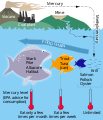File:MercuryFoodChain.svg

Size of this PNG preview of this SVG file: 512 × 596 pixels. Other resolutions: 206 × 240 pixels | 412 × 480 pixels | 660 × 768 pixels | 880 × 1,024 pixels | 1,759 × 2,048 pixels.
Original file (SVG file, nominally 512 × 596 pixels, file size: 54 KB)
File history
Click on a date/time to view the file as it appeared at that time.
| Date/Time | Thumbnail | Dimensions | User | Comment | |
|---|---|---|---|---|---|
| current | 23:20, 12 December 2022 |  | 512 × 596 (54 KB) | YitzhakNat | change to compatible font - noto sans; ̟ shadow and position of text centered in some places |
| 08:57, 26 April 2016 |  | 512 × 596 (33 KB) | Sertion | Removing a weird image in the svg. | |
| 08:54, 26 April 2016 |  | 512 × 596 (39 KB) | Sertion | Viewbox instead of with/height | |
| 22:24, 18 March 2016 |  | 225 × 262 (39 KB) | M5 | =={{int:filedesc}}== {{Information |Description= {{en|This figure shows some common sources of mercury, the conversion to toxic methylmercury and the outline of EPA consumption recommendations for certain types of fish based on mercury levels. <br />Th... |
File usage
The following pages on the English Wikipedia use this file (pages on other projects are not listed):
Global file usage
The following other wikis use this file:
- Usage on fa.wikipedia.org
- Usage on id.wikipedia.org
- Usage on ko.wikipedia.org
- Usage on lv.wikipedia.org
- Usage on pt.wikipedia.org


